Monthly Archives: December 2018
30th December 1918 Monday
Fortnight Old News Gets to Archangel
All material produced or reproduced here and throughout this work is the sole copyright of the author and the family of Doctor D.C.M. Page MC
“I paid another visit to Solombola on the 30thwhen I learned that Col. Richmond had been sent up to Obozerskaya to take over from Harrison the job that I had. I also heard the result of the elections at home, and was pleased to hear of Asquith’s defeat by Col. Sprot.”
News had now reached Archangel of the election at home on December 14th. Herbert “Squiffy” Asquith, a barrister who as Prime Minister in August 1914 led Gt. Britain into what became The Great War. Asquith like many Prime Ministers including the man that succeeded him David Lloyd George, was a controversial character.
The public had their say on his performance in the election of December.
Still leader of the non-coalition Liberal Party, Asquith assumed his parliamentary seat of East Fife was safe. He only made a couple of brief visits to his constituency despite a concerted effort of campaigning against him by local women, some of whom now had the vote for the first time
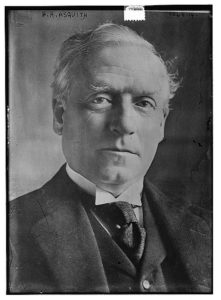
Herbert Henry Asquith. Library of Congress LC-DIG-ggbain-23315 http://loc.gov/pictures/resource/ggbain.23315/
The local Scottish Unionist Party put forward a candidate Colonel Sir Alexander Sprot. Against the odds Sprot polled 8996 votes to Asquith’s 6994. He returned to parliament via a by-election in Paisley during 1921, but Sprot only lasted one term being defeated in 1922 and again in 1923.
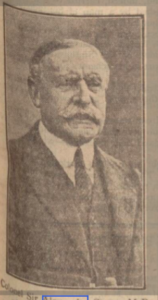
Col. Sir Alexander Sprot MP. From Dundee Evening Telegraph 8th February 1929 (his death). Image © D.C.Thomson & Co. Ltd. Image created courtesy of THE BRITISH LIBRARY BOARD. https://www.britishnewspaperarchive.co.uk
Find out about our connection with Dr Page and an introduction to his diary here
Boxing Day 1918
On the Mend!
All material produced or reproduced here and throughout this work is the sole copyright of the author and the family of Doctor D.C.M. Page MC
“I had my first outing next day, when I went along to 85 General Hospital, where the sergeants were having their Christmas dinner. They did things in great style. I had a drink with them, and got back to my bed about 5 p.m.”
Find out about our connection with Dr Page and an introduction to his diary here
Christmas Day 1918
Christmas Day in the Sick Bed
All material produced or reproduced here and throughout this work is the sole copyright of the author and the family of Doctor D.C.M. Page MC
“Christmas Day, 1918 passed off very successfully, and I was able to get quite a deal of enjoyment out of the day. In the morning I had hordes of visitors, including old Col. McDermott. Then at one o’clock the chef served us up a most excellent eight-course dinner. He excelled himself. The O.C. of the Hospital, Col. Omyrod, supplied us with champagne, and sweets, cigars and cigarettes were supplied by the Red Cross – American and British – and Y.M.C.A. Afterwards we danced, and played games (musical chairs etc) with some of the Russian sisters. There was a splendid concert in the hall at night, and then more dancing. The chef, who was well ‘on’, caused great amusement by dancing in and out of his kitchen in white cap and apron in true musical comedy style.”
This was Douglas’s fourth Christmas of the war. Christmas Day 1915 was spent with the men of the 130th (St. John) Field Ambulance in Calonne.
Christmas Day 1916 was spent with hospital patients in Bonnie Scotland.
Christmas Day 1917 was when the padre got rather muddled. Christmas 1918 was the turn of the chef to have one too many.
Find out about our connection with Dr Page and an introduction to his diary here
18th to 24th December 1918
Shirking D.D.M.S.?
All material produced or reproduced here and throughout this work is the sole copyright of the author and the family of Doctor D.C.M. Page MC.
“Whilst I was in hospital Col. Blackham, our new D.D.M.S., decided to go home, as he had had enough of North Russia. Soon after he arrived in this God-forsaken country, he developed a slight chill, and admitted himself to the hospital ship ‘Kalyan’, and didn’t budge from these comfortable quarters till he left for England. The ‘Kalyan’ was supposed only to be for serious cases, but, I suppose, D.D.M.S.s with chills came under that category! Col. McDermott, I heard, was to remain on as D.D.M.S. until another came out from England!”
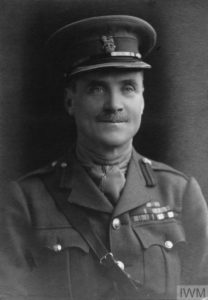
Colonel R J Blackham CMG CIE DSO Copyright: © IWM. Original Source: http://www.iwm.org.uk/collections/item/object/205290676
Douglas’s condescending view of Col. Blackham may have been fairly typical of perceptions of established long serving officers held by many lower ranked and volunteered or conscripted servicemen. He had already expressed his dismay at some of the actions or non-actions of the man Blackham was sent to replace (Col. McDermott) so the news that his replacement had possibly used his position to excuse himself through illness and escape an uncomfortable existence here in Archangel didn’t sit kindly with Captain Page.
Major General Robert James Blackham
Born in 1868, Irishman Blackham was clearly an accomplished man in his own right. He had studied medicine in Dublin and qualified as a doctor in 1892. Not satisfied with that he went on to study law and was admitted to London’s Inner Temple in 1903. He went on to be a barrister and accomplished all this whilst being a serving officer in the Royal Army Medical Corp.
He was awarded a Distinguished Service Order in 1912 after attending to Charles Hardinge, the Viceroy of India who was injured following an assassination attempt in 1912. He had been stationed in India, France, Belgium, Italy as well as Ireland. He was also at the Somme, Messines and Passchendaele and received many awards from the countries he served in.
During World War 2 he came out of retirement and served until the end of the war being promoted to Major-General. He died in 1951 at his home in East Sussex aged 83.
Find out about our connection with Dr Page and an introduction to his diary here
16th December 1918 Monday
Sick with Flu but the Bloody Fish Drink all the Water!
All material produced or reproduced here and throughout this work is the sole copyright of the author and the family of Doctor D.C.M. Page MC.
“On Monday 16thDecember I was admitted to 53 Stationary Hospital suffering from influenza, and a severe pain in left hip, which was diagnosed as ‘gluteal neuritis’, but which eventually turned out to be rheumatoid arthritis. This had been brought on, no doubt, firstly, from being struck on the hip by a large piece of shell at Langemarcke, Belgium, and secondly, from exposure in the swamps up the line. I was treated very well during my stay in hospital which took me into the New Year. I was put in a 3-bedded ward, and from my bed therein I looked out on to the main hospital approach, and could see all who came and went. Relays of Russian sisters took my temperature most conscientiously two or three times daily. Most of them could talk French, so that one could make them understand one’s wants.
For a while the occupant of one of the other beds in my ward was Lt. Commander Richardson, D.S.O., D.S.C., Albert Medal etc. Before the war he was chief mate on a cargo boat plying between Hull and the Continent. During the war he had spent most of his time in Russian waters on various boats, most of which had been sunk under him. He had been torpedoed three times in the Black Sea, and had many thrilling tales to tell. He talked Russian fluently, and was a tough customer. His flow of non-Parliamentary language was the richest I’ve ever heard. It beat any sergeant-major’s hollow!
Richardson was in Archangel when the Revolution broke out, and had great difficulty in getting away. He had to go about disguised for many days as a Russian peasant. The town at that time was full of anarchists, murderers, and convicts who had been released from all the great state convict settlements around Archangel, including the large fortress of Peter and Paul. He was again in Archangel when the Bolsheviks commenced upsetting things. Archangel, at that time, was a busy port, for many British ships were bringing ammunition, guns, and equipment for the Russian Army. Rasputin’s agents set fire to one British ammunition ship – The Earl of Forfar – which was lying alongside the quay at Bakharitza. Richardson’s ship was lying in mid-stream close by. Some of the Earl of Forfar’s crew failed to get away in time, and Richardson rowed over to the blazing ship, whose holds were full of shells etc, climbed aboard, rescued the men, and rowed away to safety. He had only covered half the distance between the ‘Earl of Forfar’ and his own ship, when the former blew up, wrecking half of Bakharitza, breaking nearly all of the windows in Archangel, across the water, and causing an enormous death-roll. Richardson escaped with a wetting, and was awarded the Albert Medal.
I had always wanted to meet the man, as I had heard so many tales about his great bravery, and rebellious disregard of all danger. Many a time he has saved the situation ‘up the line’ here with his little tug-boat got up as a ‘b—– battleship’ as he put it! He didn’t care a rap for Generals, Admirals or any other high officials. One story especially do I like concerning Richardson. Here it is. A certain young pup of a red-tabbed officer on General Ironside’s staff was busying himself about sending some stores in barges up to one of the advanced positions on the river. This was in summer when the river was very low. Richardson had at that time something to do with river transport, and when the young officer told Richardson that he wanted several barges laden with ammunition sent up the river, Richardson replied that it couldn’t be done as there was no water in the river. ‘But’, said the youngster, ‘where has all the water gone?’ ‘Oh’ said Richardson, ‘I suppose the b———-y fish have drunk it up!’”
Edward Henry Richardson RNR held the rank of Temporary Lieutenant when during 1916 he had been involved in the unfortunate incident in Bakaritza opposite Archangel.

On the 8thNovember 1916 at 1pm an explosion occurred on the Russian steamer “Baron Driesen” which was docked at Bakaritza. The blast was so immense that adjacent vessels as well as wharves were damaged. The resultant blaze rained embers and debris onto the decks of vessels moored at the dock, eventually spreading the flames to the British steamer SS. Earl of Forfar. She was under the command of Captain James Campbell Hurry and was loaded with ammunition and high explosive shells. Captain Hurry in an effort to rescue men from his ship bravely boarded her with some volunteers and had to lift live shells out of the way to get to the crew. Seven injured men were successfully removed from the ship, some physically carried by Hurry. Alongside the Earl of Forfar was moored a 100 ton floating crane from which cries for help were heard and using only a single plank Hurry boarded the crane and brought out another injured man. Lt. Richardson was master of the tug “Sunderland” and along with members of his crew volunteered to board the Earl to rescue the stricken crew members.

SS. Earl of Forfar
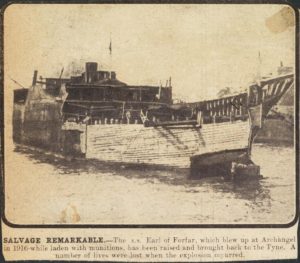
Ten minutes after the last man was removed an explosion took place towards the stern of the Earl of Forfar with such force that windows were smashed in Archangel on the opposite side of the Dwina.
Douglas attributed the fire to “Rasputin’s agents”. 1916 was pre-revolution and Rasputin was thought to have been urging Tsar Nicolai to make peace with Germany and withdraw from the war, allowing the withdrawal of German troops from the Eastern Front. This was exactly the reason that Douglas was part of the force now in Russia trying to force the re-opening of the Eastern Front, after the Treaty of Brest-Litovsk between Lenin and Germany in March 1918, but now following the Armistice it was now no longer an issue.
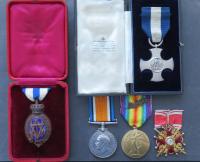
The group of medals won by Lt. Commander Richardson. http://www.british-medals.co.uk/british-medals/awards-gallantry-and-distinguished-service/albert-medal-group-sea-and-dsc-group-both-
The S.S Earl of Forfar was built in 1910 by Russell and Co. on the Clyde, for the Earl of Forfar Steamship Company. She had a Gross Rated Tonnage of 4,453 tons and was powered by steam. Russell and Co were the most prolific builder of merchant ships throughout the period of the Great War.
Although mostly destroyed by the fire and explosions she was eventually salvaged and brought back to the River Tyne for repair.
Find out about our connection with Dr Page and an introduction to his diary here
11th December 1918 Wednesday
Mutiny in Archangel!
All material produced or reproduced here and throughout this work is the sole copyright of the author and the family of Doctor D.C.M. Page MC.
“On Wednesday 11thDecember some Russian troops billeted in Archangel refused to go up the line, and barricaded themselves inside their barracks. They fired on anyone who came near them. American, French and British troops were rushed to the spot, surrounded the barracks, and soon quelled the disturbance. An aeroplane dropped a bomb on the place, and the Americans lobbed a few trench-mortar bombs over the building. The ring-leaders were arrested. They numbered 22 in all, and 11 of them were made to shoot the other 11, who had previously dug their own graves. This gruesome ceremony took place on the barrack square, which was surrounded on all sides by British soldiers with machine guns. Col. Shevtoff, whom I met up at Seletskoe, and who commanded these rebels, afterwards committed suicide, as he was so ashamed of his men.
This revolt scared us all rather badly. We were served out with rifles and bombs, and had armed R.A.M.C. sentries posted on our billets all day and night. It was not considered safe to go out after dark. It was quite a common thing at night to hear rifle shots, and many British officers had narrow escapes in Archangel. The Assistant Provost Marshall was fired at three times whilst leaving the hospital ship ‘Kalyan’, but was not hit. We also obtained two machine guns, and were trained in their use. Barbed wire entanglements, and sand-bag redoubts were built all round the hospital.”
This revolt by very reluctant Russian recruits is the subject of subsequent criticism by modern observers and historians. General Ironside’s account in his memoir Archangel 1918-1919 describes the event in terms that are in conflict with the reports of eye witnesses and those who were actually in Archangel at the time. The conflict of accounts has been highlighted by Damien Wright in his book ‘Churchill’s Secret War with Lenin’. Ironside told us that after the men had surrendered the ring leaders were tried by court martial and sentenced to death. Ironside claimed that by his intervention he managed to commute their sentences to a long term of imprisonment. Douglas’s account of the incident ties in with other diary entries. American, Charles B Ryan of the 339th Infantry gives more insight into the incident. Along with other reports here is my summary of the story.
The Russian population were in no mood to fight. The peasants from the country were more interested in where the next meal was coming from than in any political ideals. Life under the Tsar was simple, but in truth the population was totally unaffected by whoever was ruling the country. They may well have known about the Russian Royal family, but their day to day existence wasn’t touched by any kind of political influence, or at least that is how it would have seemed. They were surrounded everywhere here in the north by the natural resource that provided their living, trees. More important to the people was their Christianity which remains un-waivered even today.
The forest was the provider of everything they knew. It gave them material for building, fuel for burning, wood for selling. The forest was so immense that in most part every inch of the land was covered by dense woodland only pierced by the course of the rivers and the few paths made for sleighs and carts, carved through it to provide transport links. Until the railway from Vologda up to Archangel had arrived in 1897 the river was the only trunk route. The main transport went via river of which the mighty Dwina or Dvina was king. This however would only be fully navigable during the Summer from about May until November.
The Constantine Barracks were situated on Troitsky Street in Archangel and accommodated over 700 men. These men were part of an intended army of 17,000 men of which by this time only just over 1400 had been coaxed into service. Of these men quite a few were captured Bolsheviks that had been taken from the front line, or those reds that had volunteered and were effectively spying. There had been constant issues of unrest with them and they had consistently lobbied for improvements to their conditions. Some of the demands such us the right not to salute and a complaint that their officers were wearing Tsarist insignia might seem somewhat frivolous but their demands for increased rations including more cigarettes may well have been legitimate. It is well established that the British had treated the native population including military recruits with less than generous rations and this was a cause for resentment in Archangel.
Ironside’s version of events were that he gave orders that the men would be paraded at the barracks his intention being to “put the matter of discipline to the test” (1). Others have testified that he intended they be sent up the line to fight. Bearing in mind that the main reason that these men had signed up was to get regular meals and a pay packet and not to fight any fellow Russians, they duly refused to fall in. Having experienced life under Ironside’s predecessor General Poole, who ruled in the manner of a colonial governor and endeared himself to no one, the British weren’t universally popular.
On hearing the news of a revolt, Ironside went to the barracks to see the situation for himself. He was accompanied by a detachment of the 2/7th Durham Light Infantry and possibly a few R.A.F. men. The Durhams had not long arrived in Archangel and had been intended for garrison duty, which would have been more suited to the 2/10 Royal Scots who were not classed as fit for fighting. As he arrived he saw the men of the new 1st Archangel Regiment had locked themselves in waving a lot of red flags and brandishing rifles from the window. Shots were fired into the air from the roof.
General Marousheffsky who commanded the Russians, calmly ordered that some Russian N.C.O.s bring up a Lewis gun and from the rear trained it on the main building. Then a couple of Stoke’s Mortars were brought in. Morousheffsky used a loudhailer to shout orders to the men which only resulted in more flag waving and shouting. Firstly, under Ironside’s direction a mortar was sent over the building landing in the yard behind to no effect. A second mortar bomb landed and exploded on the roof which had the desired effect. All the flags were dropped and men began to appear from the building some half-dressed. The ring leaders were asked to identify themselves and thirteen older men, mostly N.C.O.s immediately stepped forward. They were arrested and marched off under guard. The rest of the men were returned to barracks and told to make themselves ready. This they did quite happily before being marched off to the station the following day to catch a train to Obozerskaya and the front. The mutiny therefore had resolved itself without further trouble and all could relax once more.
Ironside then states that following court martial the guilty men were all sentenced to death but following a previous communication from King George V requesting that no men be executed following the Armistice, General Ironside in an act of compassion commuted the death sentences to terms of imprisonment.
Compare this then to the account given by Captain Page above and the words of Charles Ryan.
Referring to the S.B.A.L (the Slavo-British Allied Legion) or the New Russian Army, he says that the situation “had been brewing for some time, but had been nipped in the bud on the other occasions” (2).
A combined British, French and American group armed with Lewis machine-guns opened fire on the building, breaking all the windows, killing one and wounding three men. The Russians returned fire before surrendering in a short-lived battle. The mortar that was sent over the roof had landed in the space behind killing an unfortunate man that was there.
The disconsolate Russians were then lined up while every tenth man was counted out. This was on the orders of Ironside as testified by Company Sergeant Major Fred Neesam of the Green Howards (3) It was then made clear in no uncertain terms that unless they gave the names of the ringleaders all of these men would be shot. Thirteen men were identified after which their own men were forced to shoot them under threat of a machine gun placed behind them. There was to be swift justice, a court martial (although no mention of one in Charles Ryan’s account). The men were forced to dig their own graves then shot in the back of the neck by their own men. One hundred years on this would almost certainly be classed as a war crime. There are some inconsistencies in the accounts but all conflict with the face-saving account of General Edmond “Tiny” Ironside.
(1) Naval and Military Press “Archangel 1918-1919” by Gen. E. Ironside.
(2) https://quod.lib.umich.edu/p/polar/86620.0002.001/62?
(3) Tom Stacey “At War with the Bolsheviks” by R. Jackson
Find out about our connection with Dr Page and an introduction to his diary here
A Visit to the Dentist
All material produced or reproduced here and throughout this work is the sole copyright of the author and the family of Doctor D.C.M. Page MC.
“Nothing much happened during the next few days. I developed a most infernal dose of toothache, and had eventually to go along to 53 C.C.S. where Haldane, the dentist, removed the offending molar under gas. I laughed heartily all the time I was under the gas, and succeeded in biting a bit out of Haldane’s finger!”
Back in February 1916 Douglas had another tooth removed but on that occasion he definitely wasn’t laughing.
Find out about our connection with Dr Page and an introduction to his diary here
1st December 1918 Sunday
New ADMS arrives with Troops on the Stephen
All material produced or reproduced here and throughout this work is the sole copyright of the author and the family of Doctor D.C.M. Page MC.
“On Sunday, December 1st, I travelled by train to Economie, a small village on the Dwina about 15 miles below Archangel. There I awaited the arrival of the ‘Stephen’ which had some stores aboard for 85 General Hospital. Of course, it was a bitterly cold day, and I was nearly frozen stiff hanging about. A special train arrived during the forenoon full of red, blue, pink and green-tabbed gentlemen, including Sir George Prescott, the Base Commandant, and Major Rooke, the D.A.D.M.S. The latter told me that the new A.D.M.S. – and Col. Blacklaw – was due to arrive on the ‘S.S. Stephen’ and that he was a regular thruster. It seems that the wind is vertical at Medical H.Q! This tickled me immensely! The river here was entirely frozen over. Shortly after noon an ice-breaker appeared round the bend of the river, cutting a way through the ice for the old ‘Stephen’ which soon rounded the bend. It was a great sight to see the ice-breaker cutting her way so easily through the ice which was a foot or two thick in places. These ice-breakers can cut through ice 14 or 16 feet thick. They have very powerful engines, and specially strengthened bows. It was 3 o’clock before the ‘Stephen’ was berthed owing to the difficulty of getting alongside the quay due to the ice. I wasn’t allowed on board to claim the stores, so left in disgust, frozen stiff, and very hungry. I reached Solombola about 9.30 p.m. There were a lot of troops on board the ‘Stephen’.”
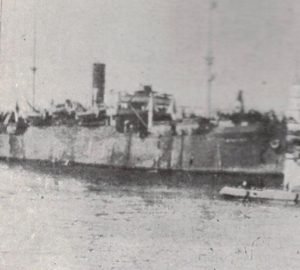
The Stephen at Archangel in May 1919
Find out about our connection with Dr Page and an introduction to his diary here